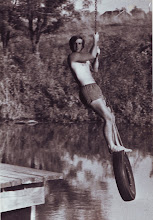Yesterday was the last Saturday in April, which means that next Saturday will be the first Saturday in May. It has been a beautiful spring in the bluegrass, but it is time for the racing season to move from Lexington to Louisville. Time for the Run for the Roses. I have my mint infused simple syrup already in the frig; it will steep all week.
Speaking of bluegrass, I finally got a clear vision on what that looks like. You can see the small blue flowers in the grass in our back yard.
 |
| Dorcas at 9 years old |
 |
| Kent 1941 |
The family had moved from St. Louis to Central Kentucky after a particular bit of good fortune revolving around an oil field in Illinois. Dorcus had loved horses from early on and Grandfather was ready to indulge in his dream of being a gentleman farmer and horseman. As my friend Kim says, the best way to make a small fortune in the horse business is to start with a large one.
 |
| Grandfather Denzil talks with the jockey |
Kendor was a mudder, which means he ran better on a wet track. It rained leading up to the Derby in 1946 was not wet enough on race day to give him the advantage he needed. I'd heard about this race forever, but always wanted to know a little more. Then we found the broadcast and the Friday Courier Journal article about the race. Listen for the call ending with "As you might expect" in describing Kendor's last place finish. That part still stings just a little bit, actually.
Aunt Leslie was at that race with the UK band before she met Uncle Donn. They were married in the summer of 47, a little more than a year later. Uncle Kent would maintain a life long interest in thoroughbred horse racing and make a career out of it, as editor of the Blood-Horse magazine.
Now, some of the family stories are apocryphal, or at least verging on it. My favorite part of the derby story is that there is proof that it is true. Proof that is easier to share at a dinner party than an obscure old recording. All KY folks know about the derby highball glasses. Many don't know about the loser cups.















